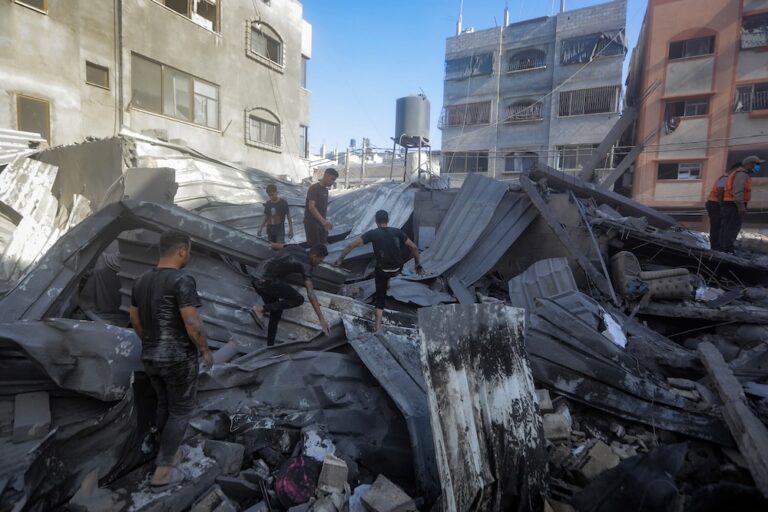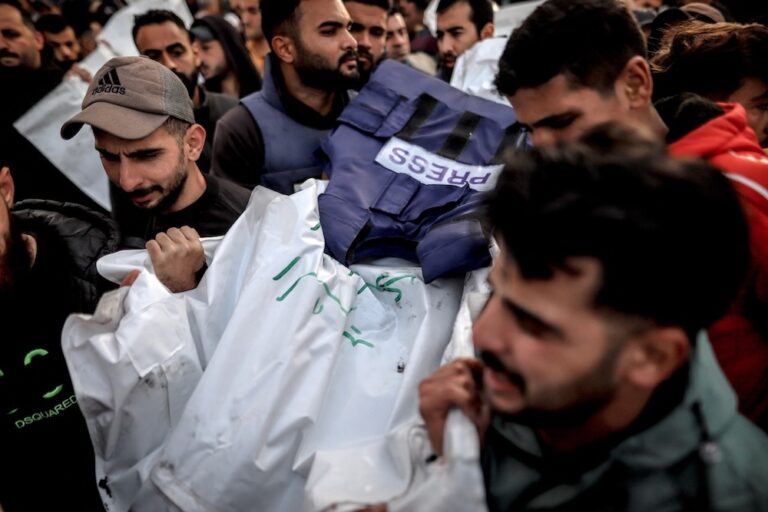(RSF/IFEX) – The following is a 22 January 2003 RSF press release: New attacks on press freedom as election approaches Reporters Without Borders to call on candidates to pledge support for media Reporters Without Borders today repeated its concern about press freedom in Israel after the beating of two Palestinian photographers working for international news […]
(RSF/IFEX) – The following is a 22 January 2003 RSF press release:
New attacks on press freedom as election approaches
Reporters Without Borders to call on candidates to pledge support for media
Reporters Without Borders today repeated its concern about press freedom in Israel after the beating of two Palestinian photographers working for international news agencies and the official questioning of a journalist about a report concerning alleged corruption by Prime Minister Ariel Sharon.
“Instead of investigating the suspected corruption itself, state prosecutor Elyakim Rubinstein clearly prefers to exert pressure on the media,” said Reporters Without Borders secretary-general Robert Ménard. “The questioning of the journalist is completely inappropriate.”
The organisation has frequently denounced attacks on press freedom in the Palestinian Territories by Israeli army troops using excessive and undue force against foreign and Palestinian journalists, who have been roughed up, insulted, targeted with weapons and harassed.
The new concern comes on the eve of next week’s general election, when Reporters Without Borders will call on candidates to promise to respect press freedom. The appeal will be made in Hebrew and in English, in Haaretz, on 24 January.
The two journalists, photographers Jaafar Ashtieh of Agence France-Presse and Nasser Ashtieh of Associated Press, were hit and threatened with death by Israeli frontier guards in Nablus on 21 January when they tried to take pictures of the guards driving a jeep at high speed with two Palestinians hanging on to the hood to keep from falling off. The guards stopped and punched the photographers, warning that “if we see a picture of us published anywhere, we’re going to kill you.”
Also on 21 January, a commission of enquiry appointed by the justice ministry questioned Baruch Kra, a journalist with the daily paper Haaretz, which reported that an investigation had begun into a loan to Sharon by a South African businessman. Kra refused to reveal his sources, but a Tel Aviv prosecutor, Liora Glatt Berkovich, admitted at the same time that she had been the source.
“The journalist was not questioned about the source of his information, but because he was suspected of obstructing the enquiry,” the ministry said.
The paper had reported on 7 January that Sharon and his sons Omri and Gilad were suspected of corruption, fraud and breach of trust concerning a $1.5 million loan to the prime minister by a South African businessman friend, Cyril Kern.
Legal expert Moshe Negri said the questioning of a journalist was unprecedented and that the insinuation of obstructing justice was “completely unfounded.” The Israeli supreme court ruled in 1987 that police cannot force journalists to reveal their sources except in exceptional circumstances.


